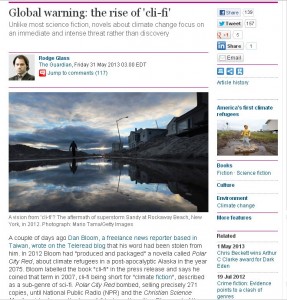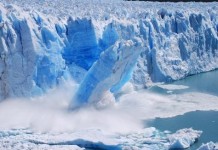![]() Just in case you missed it, we ran a post last Tuesday, May 28, by Dan Bloom, a freelance journalist based in Taiwan who’s also an occasional TeleRead contributor. Bloom’s post centered around a relatively recent literary term—’cli-fi,’ short for ‘climate fiction’—which Bloom himself claims to have coined back in 2007. The term refers to a subgenre of science fiction in which horrific futures are imagined as a result of environmental disasters.
Just in case you missed it, we ran a post last Tuesday, May 28, by Dan Bloom, a freelance journalist based in Taiwan who’s also an occasional TeleRead contributor. Bloom’s post centered around a relatively recent literary term—’cli-fi,’ short for ‘climate fiction’—which Bloom himself claims to have coined back in 2007. The term refers to a subgenre of science fiction in which horrific futures are imagined as a result of environmental disasters.
 Bloom has written about the climate fiction subgenre for TeleRead in the past, and his posts always seem to attract their fair share of detractors and ridicule.
Bloom has written about the climate fiction subgenre for TeleRead in the past, and his posts always seem to attract their fair share of detractors and ridicule.
So we were naturally very pleased to see that Rodge Glass, writing about Bloom’s latest TeleRead post for The Guardian‘s culture desk, approached the subject with both respect and an open mind.
“Whereas 10 or 20 years ago it would have been difficult to identify even a handful of books that fell under [the cli-fi] banner,” Glass writes, “there is now a growing corpus of novels setting out to warn readers of possible environmental nightmares to come.”
Here, Glass offers a handy roundup of contemporary novels—some well-known, and some not—that he considers worthy of the cli-fi title, even going so far as to dub Margaret Atwood “perhaps the most high-profile cli-fi author… ”
Barbara Kingsolver’s Flight Behaviour, the story of a forest valley filled with an apparent lake of fire, is shortlisted for the 2013 Women’s prize for fiction. Meanwhile, there’s Nathaniel Rich’s Odds Against Tomorrow, set in a future New York, about a mathematician who deals in worst-case scenarios. In Liz Jensen’s 2009 eco-thriller The Rapture, summer temperatures are asphyxiating and Armageddon is near; her most recent book, The Uninvited, features uncanny warnings from a desperate future. Perhaps the most high-profile cli-fi author is Margaret Atwood, whose 2009 The Year of the Flood features survivors of a biological catastrophe also central to her 2003 novel Oryx and Crake, a book Atwood sometimes preferred to call “speculative fiction”.


































Apart from a mile-high glacier rumbling down from Canada, I have trouble getting alarmed by climate change scenarios. We humans aren’t very good about getting along with one another, but the one thing we’re really good at is adapting to widely differing climates. We’re the only creature that lives everywhere from above the Arctic circle to the equator and in every locale from deserts and wetlands. We wear clothes, we build homes, in short we adapt quite well to climate change.
And historically, we’ve done particularly well during the warm spells. It’s those ice ages and little ice ages that make life hard.
Well, the Guardian should know — they’ve been publishing cli-fi for over a decade.
Lewis Gannett is another CLI FI writer to pencil in: In 1996 he published ”Magazine Beach” (HarperPrism), a prescient black comedy about climate change and terrorism, published in translation in Italy as well.
PS: by the way, “coining” a term like cli fi is not something someone can take “credit” for, since the term sci fi already existed for over 50 years if not more, and cli fi is a just a rhyming riff on sci fi, so let’s not say I “coined” cli fi in 2007 in one of my blog posts. Let’s say I put the term ”in play” with my ongoing PR initiatives about cli fi in blogs, opeds and letters to editor. And I helped put the term in play merely by never giving up on it and by trying my best to see the term popularized by the media. I could not do it by myself. It took NPR and the Christian Science Monitor stories in April 2013 — and now the Guardian and the Financial Times in the UK — to give the term the media boost it needed. Nobody owns the cli fi term. It belongs to all of us now. TeleRead also played a pivotal role, both in 2012 and 2013, because it was the 2013 TeleRead piece that got picked up by the Book Trade Group News in London last week and set the UK media in motion. See? PR pays off!
dear danny
To answer your question, I think climate change fiction (or ‘cli-fi’)
has, in just a few years, moved beyond simplistic apocalypse scenarios
to engage intelligently with questions of science and policy (Kim
Stanley Robinson’s Science in the Capital trilogy) and environmental
justice (for example, Barbara Kingsolver and Paolo Bacigalupi, in very
different ways). By making us ‘live’ both the devastating impacts of
climate change and ways of dealing with these, these novels can’t help
but intervene in the ongoing debate on climate change policies.
Adeline
Dr Adeline Johns-Putra
Reader in English Literature
English Subject Leader
School of English and Languages
University of Surrey
“We humans aren’t very good about getting along with one another, but the one thing we’re really good at is adapting to widely differing climates.” While I don’t think humans will go instinct, millions will suffer as a result of drought, rising oceans, and other effects of climate change. So it’s nice that you can be so cavalier about it, since I’m sure it helps you sleep at night, but reality is a bitch.
ReyNARD Loki in nyc cleaned up this page a bit:
http://en.wikipedia.org/wiki/Cli_fi
Also, I added cli-fi here:
http://en.wikipedia.org/wiki/Science_fiction_genre#Genres_of_science_fiction
And added Climate here:
http://en.wikipedia.org/wiki/List_of_science_fiction_themes
This is a subject close to my heart. I’m a fiction writer who is putting climate change (indirectly) into a literary project. I talked to another novelist (and climate activist) and we agreed that as a subject it is hard to approach climate change directly; an indirect approach is better because it doesn’t seem to be more message-oriented than art-oriented. You can also use more irony and have the potential to attract skeptical readers. In my case (as with McEwan’s Solar), climate change is being used as a subject for satire, and the overall literary project is not about climate change — but just one section is.
Sci fi fiction as a genre has always tried to imagine future dystopias, and to the extent that they portray climate change plausibly, I guess we can call it a qualified success. But I’m not sure that the novel is a good form for dramatizing climate change or even an effective proselytizing tool. Wouldn’t movies be better? Michael Crichton’s contrarian novel about climate change really did little to galvanize opinion — except for denialists seeking celebrity names to confirm their ignorance.
I’m not a sci fi writer, but if I were and I wanted to write about climate change within a fictional context, I would probably throw in a rogue geo-engineering experiment gone awry.
We’re quickly reaching the point where climate change — the issue, the politics, the economics — is so deeply baked into our culture that all novels have to account for it in some way. In the same way that the possibility of nuclear doom loomed over stories written between 1950 and 1990, the same will be true for climate change.
robert nagle you said it best here: ”We’re quickly reaching the point where climate change — the issue, the politics, the economics — is so deeply baked into our culture that all novels have to account for it in some way. In the same way that the possibility of nuclear doom loomed over stories written between 1950 and 1990, the same will be true for climate change.”
well said!
robert nagle this is key and you said it well. may i quote you on this in future blog posts? credit to you for quote? ” In the same way that the possibility of nuclear doom loomed over stories written between 1950 and 1990, the same will be true for climate change.”
“In the same way that the possibility of nuclear doom loomed over stories written between 1950 and 1990, the same will be true for climate change.”
And the nuclear doom happened, when?
@MRW, that is a good point, too. All views welcome in my room! Hopefully, climate change chaos will never happen. I also hope so. So very good comment, sir!
For Dan, feel free to quote or cite me. Or email me! idiotprogrammer at gmail.com !
To address MRW’s point, what does it matter if nuclear annihilation happened or not? The potential was certainly there, and the paranoia about it really stirred a generation. One 1980s survey of American youth found that over a third believed that nuclear holocaust was inevitable. Don’t you think that a social perception — valid or not — is interesting and important?
Finally, the world was lucky that the superpowers didn’t use nuclear weapons. Wars usually start on misperception of risk, and both sides didn’t see each other accurately. Nuclear weapons might have raised the threshhold of war to happen, but with a series of missteps, this could have led to a conflagration.
I like to compare climate change to a nuclear missile which takes 40 years to hit its target. We already know that one has already been launched, and there’s nothing we can do about it. We also know that more will be launched as a result of industrial policies and a failure to reach an international agreement regarding climate.
I have written about the nuclear weapon vs. climate change comparison before . Actually though, the historical analogy which I have started to use is with the “peculiar institution” of slavery in 19th century America.